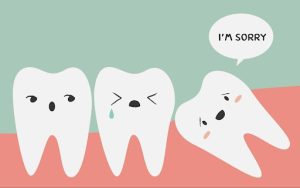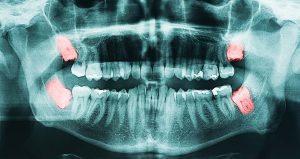Unveiling the Mystery of Wisdom Teeth: Understanding the Problems and Solutions
Introduction:
Your smile is a powerful asset, and maintaining good oral health is essential for preserving it. One common dental concern that many individuals face is issues with their wisdom teeth. These third molars, also known as wisdom teeth, usually emerge between the ages of 17 and 25. While some people experience no problems with their wisdom teeth, others may encounter various issues that necessitate removal.
In this comprehensive guide, we will delve into the world of wisdom teeth, exploring their purpose, potential problems, and the solutions available, including the wisdom tooth removal process.

Understanding Wisdom Teeth:
- Origins and Purpose: Wisdom teeth are vestiges of our evolutionary past when our ancestors had larger jaws and needed these extra molars for grinding tough, coarse foods. In modern times, our diets and jaw sizes have evolved, rendering wisdom teeth somewhat obsolete. As a result, many individuals do not have sufficient space in their mouths for these additional molars to emerge properly.
- When and How They Emerge: Wisdom teeth typically start emerging in late adolescence or early adulthood. The emergence process can be painful for some individuals, while others may not even notice it happening. Regular dental check-ups are crucial during this time to monitor the development and alignment of wisdom teeth.
Common Problems Associated with Wisdom Teeth:
- Impaction: One of the most prevalent issues with wisdom teeth is impaction. When there isn’t enough space in the jaw for the teeth to emerge correctly, they may become partially or fully impacted. This can lead to pain, swelling, and infection.
- Crowding: The emergence of wisdom teeth can cause crowding in the mouth, affecting the alignment of existing teeth. This crowding may result in misalignment, crooked teeth, and difficulties in maintaining proper oral hygiene.
- Infection and Gum Disease: Partially erupted wisdom teeth create pockets where bacteria can accumulate, leading to infection and gum disease. The difficulty in cleaning these areas effectively contributes to the risk of oral health issues.
- Cysts and Tumours: In rare cases, wisdom teeth may develop cysts or tumours. These growths can lead to more severe complications if not addressed promptly. Regular dental check-ups and X-rays are essential for detecting these issues early on.
Wisdom Tooth Removal – The Solution:
- Indications for Removal: Wisdom tooth removal, also known as extraction, is often recommended when there is evidence of impaction, crowding, infection, or the potential for future problems. Early detection through X-rays and regular dental check-ups enables dentists to assess whether removal is necessary.
- Preventive Removal: In some cases, dentists may recommend preemptive removal of wisdom teeth before problems arise. This proactive approach can prevent potential issues, especially in cases where there is a high likelihood of impaction or crowding.
- The Extraction Process: Wisdom tooth extraction is a routine dental procedure. The dentist will administer local anaesthesia to numb the area before carefully removing the tooth. In some cases, sedation may be offered for patients with anxiety. Specialist intervention and general anesthesia may be needed in more complex cases.
- Recovery and Aftercare: After the extraction, proper care is crucial for a smooth recovery. Patients are typically advised to follow post-operative instructions, including managing swelling with ice packs, taking prescribed medications, and adhering to a soft food diet during the initial healing period.
Benefits of Wisdom Tooth Removal:
- Pain Relief: Removal of impacted or problematic wisdom teeth can provide immediate relief from pain and discomfort.
- Prevention of Future Issues: Proactively removing wisdom teeth can prevent potential complications, such as infection, cysts, and misalignment.
- Preservation of Oral Health: By addressing issues related to wisdom teeth, individuals can maintain better oral health and reduce the risk of gum disease and other dental problems.
Conclusion:
In the journey towards a brighter smile, understanding the intricacies of oral health, including the emergence and potential problems of wisdom teeth, is paramount. Regular dental check-ups and timely intervention can make a significant difference in preventing and addressing issues related to wisdom teeth.
At Brighter Smiles Dapto Dental, our team of experienced professionals is dedicated to providing comprehensive dental care, including the evaluation and management of wisdom teeth. If you’re experiencing pain, swelling, or other symptoms related to your wisdom teeth, schedule an appointment with us for a personalized assessment and guidance on the best course of action.
Remember, a healthy smile is a beautiful smile, and taking proactive steps towards oral health can contribute to a lifetime of confident and radiant smiles.
Reviewed by Dr Kala Raj 28/11/2023



